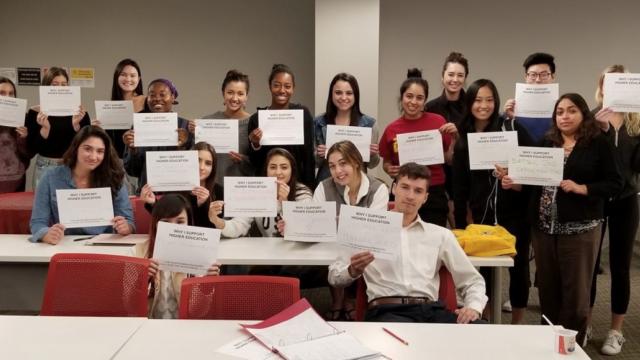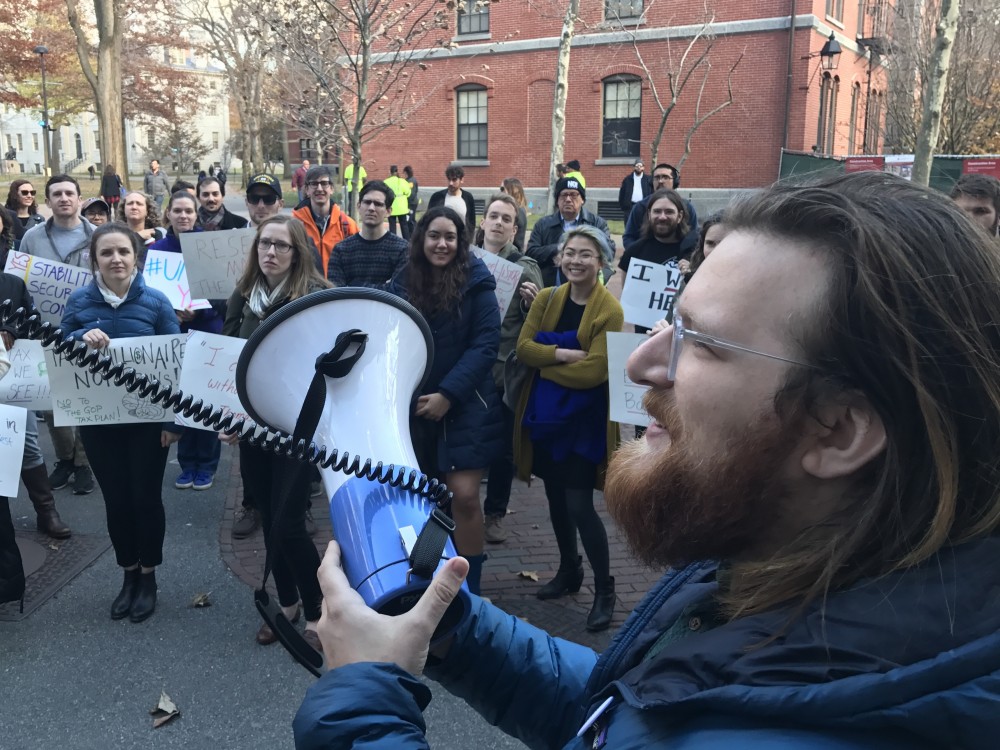
On Nov. 20, graduate students at the University of Wisconsin-Milwaukee woke up to a grim message warning them about a congressional bill that could “make the pursuit of a graduate degree much more challenging, if not impossible,” and “greatly damage our nation’s scholarly and scientific research enterprise.”
That email isn’t unique. Campuses across the country have been on notice since the GOP’s Tax Cuts and Jobs Act passed in the House on Nov. 16 – and will be more so after Friday's vote confirmed its passage in the Senate. The bill, which reclassifies graduate student tuition waivers as taxable income, would increase taxes on graduate students by as much as $10,000.
With graduate students stipends ranging anywhere between $10,000 and $35,000, the tax represents the latest salvo in the GOP’s years-long campaign to erode the foundations of higher education.
Now, graduate students have gone on the offensive. Since Nov. 29, more than 40 campuses in 30 states have organized walkouts in a move that could bring classrooms and campuses to a grinding halt. For Noah Charles, Hannah Khoddam, and Colleen Baublitz, the three organizers of the Grad Tax Walkout rallies, the protest brings much-deserved attention to the work that graduate students do.
In a statement, the Grad Tax Walkout used Columbia University as an example, citing conditions where “TAs teach stand-alone courses and run small discussion and labs sections that enable thousands of undergraduates to access a quality education, while RAs work on a variety of path-breaking research projects that propel the university’s world-renowned research programs and help bring roughly $1 billion per year in investment through grants and contracts from federal and other agencies.”
It’s personal, too. For Jack Nicoludis, a walkout organizer and Harvard graduate student, the GOP bill places an undue strain on what is already a precarious career path. “The [tax] plan is going to be a disaster. Graduate students already struggle to get by,” Nicoludis told NPR. “I just deal with that because I want to pursue a graduate degree here… I want to contribute to the science that’s done in our country."
UW-Milwaukee graduate student and walkout organizer Reed Heintzkill found both insult and injury in the persistent GOP antagonism of grad students and the sciences.
“I’m fairly certain there’s a general feeling among grad students, and probably college students in general, that politicians at the state and national [level] not only don’t have our interests in mind, but in many cases, are rooting against us,” Heintzkill said.
“There truly is so much to be outraged with at this moment in time, but this development could very well put an end to a significant aspect of our individual identities.”
Students protesting the bill appear to have the sympathy, if not the outright blessing, of their universities and administrations. University of California President Janet Napolitano defended graduate students in a statement on Nov. 27, stating the “[graduate students] are vital to the university community and society at large: they further groundbreaking research, mentor the next generation and contribute to the economy. They are our nation’s future and deserve congressional support - not a tax hike.”
Internal memos sent within graduate schools have also offered students some resources for making good on their word. The foreboding UW-Milwaukee email, for instance, included links to a U.S. Senate directory and encouraged students to contract their representatives. Emails distributed to graduate students at Illinois State University provide similar resources while reminding students that “you can have a direct impact on this effort.”
The fresh wave of activism doesn’t guarantee the future of graduate studies, however. Not all campuses share UW-Milwaukee’s sense of urgency. In a memo obtained from the University of Texas-Austin, administrators promised to “continue to watch closely” as the bill approached a vote in the Senate. The declaration did not hint at action nor show any sign of a plan moving forward.
This kind of passive stance has been strengthened by the GOP’s recent struggle to pass any major bills. The Senate’s failure to repeal the Affordable Care Act has been at once a comfort, and also a hindrance, to students planning to protest – even if the bill was only one vote away from passing.
“It’s partly this uncertainty about whether [the bill] will actually pass,” one UT-Austin graduate student said over email prior to Friday's vote. “The last few bills haven’t passed.”
Still, the wait-and-see approach hasn’t stopped many universities and graduate students from mobilizing nationwide. Wednesday’s widespread walkouts represent only a fraction of the country’s grad student population, and the sense of urgency to act is building.
Less than 24 hours after the national walkouts, Milwaukee graduates met to discuss their campaign against the bill, preparing the groundwork for call and letter campaigns and, potentially, a “grade-in” in lieu of a walkout.
“Grad students are unique in being both suppliers and consumers in higher education, and we very much want the university to continue its operation,” said Heintzkill, who threw his support behind the grade-in. “After all, our beef isn’t with the university or its administration: it’s with the tax bill.”
“We just have no confidence that anyone in Washington cares what we think, so we need to make it real to a larger audience.”
3 WAYS TO SHOW YOUR SUPPORT
- Log in to post comments












